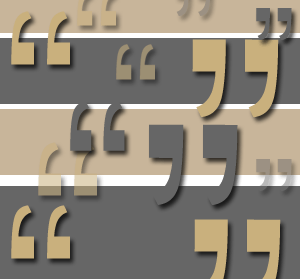
Response to George F. Will: Ravaged by Rhetoric
Editor's note: In the November 17, 2008 issue of Newsweek, George F. Will presented his view of rhetoric (also known as oratory or public speaking) in relationship to the outcome of the 2008 presidential election. Will's column, The Last Word: The Final Repudaation, is linked here. Communication scholars Tom Frentz (University of Arkansas), Jennifer Mercieca (Texas A & M University), and David Levasseur (West Chester University)provide alternative interpretations.
It is all proper and fitting, I suppose, that in his occasional editorial gambit for Newsweek magazine, the vicar of conservative wisdom, George F. Will, should address the catastrophic meltdown of the Republican Party in the 2008 presidential election. Given a person of his high moral character and impeccable literary credentials, I even expected a painful, but reflective recount of the failures of the policies of his party of choice—two spirit-numbing, life-draining wars, unparalleled corporate greed and human insensitivity, and an economic crisis that moves closer everyday to transforming recession into depression. But no, none of that accounts for this ideological apocalypse. The problem, Will assures us, what really duped and decoyed the great unwashed out there was none other than--gasp!--rhetoric, oratory, that ancient art of persuasion, not so affectionately known within the academy as the harlot of the humanities.
Unequivocally trusting James W. Ceaser's preternatural instinct for the intentions of the Founding Fathers (that itself should give the careful reader pause), Will suggests, “The Founders, Ceaser says, ‘were deeply fearful of leaders deploying popular oratory as a means of winning distinction.' That deployment would invite demagoguery, which subverts moderation.” And there's more. “The Progressives of 100 years ago,” Will laments, “wanted to popularize presidential selection by rewarding candidates gifted in the popular art of inflaming excitement through oratory. They opened a door through which, eventually, strode George Wallace, Jesse Jackson, Pat Robertson, Pat Buchanan, Howard Dean and others.” I guess Will prefers more moderate, well-networked striders like—oh—say that paragon of moral virtue, Richard Nixon, whose most memorable rhetorical utterance, “I am not a crook,” turned out to be a bald-faced lie.
But in laying the blame, and make no mistake about it, blame is being laid here, at the feet of rhetoric, Will is on solid, if rather dusty and infertile, ground. Way back there in Greek antiquity, no less an ideologue than Plato labeled rhetoric the junk food of the soul, a tasty morsel with no nutritional value in Gorgias. And Plato's student, Aristotle, didn't think much of the rhetoric before him either. He tried to boost it up a bit on the political food chain by yoking rhetoric to philosophy by way of dialectic in Rhetoric, but in so doing, he emasculated the art to such a degree that it eventually splintered off into endless categories of figures of speech. In eulogizing this once dynamic political practice, Paul Ricoeur remembered, “Before becoming futile, rhetoric was dangerous.” And rhetoric was dangerous because “it [was] always possible for the art of ‘saying it well' to lay aside all concern for ‘speaking the truth.'” Well, 2500 years of analytic philosophy and rationalist thought sure took care of that possibility. Until now. So how could this Obama character who, like Jimmy Carter before him, sports only a “thin résumé,” have reenergized this art of persuasion and, once again, made saying it well take precedent over speaking the truth?
I'll let you in on a little secret. In a move that undoubtedly made lots of dead sophists (and a few live ones as well) smile, Obama told the truth by saying it well. Reason and emotion have never been far apart in any complete account of rhetoric. Even Plato knew that, for after lambasting poor old Gorgias about the lack of nutritional value in his rhetoric, Plato has Socrates give all kinds of—well—impassioned speeches that cloaked his own version of the truth (there are, lest we forget, lots of versions of any truth) in inflammatory rhetoric. By the by, Abraham Lincoln, Franklin Roosevelt, John Kennedy, and William Clinton did the same thing. Apologists for the enlightenment project always forget that the separation of thinking from feeling, or logos from pathos in rhetorical parlance, was an ideological venture designed to enshrine reason as the once and future king of Western thought. All it takes—all it took—is an exceptional person to obliterate that opposition and tell the truth with emotional conviction. As the 2008 presidential results clearly indicate, in the hands of someone like Barack Obama, passionately telling the truth makes a big difference in American life.

